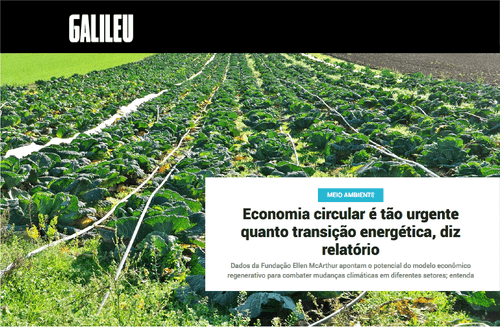
19/11/2021
Galileu magazine: economy is urgent
Revista Galileu highlighted the importance of implementing the circular economy in a very cool article about the model. Check it out:
Circular economy is as urgent as energy transition, report says
Data from the Ellen McArthur Foundation point to the potential of the regenerative economic model to fight climate change in different sectors; read further
Amidst the worldwide effort to curb the advance of climate change, the expression “circular economy” has gained prominence. If the strategies of this sustainable model were incorporated into production chains involving cement, steel, plastic and aluminum, global emissions of greenhouse gases from these four materials could be reduced by 40% by 2050. In food production, the drop in emissions by the middle of the 21st century compared to the current scenario would be even higher: 49%.
The estimates are part of a new compilation of data from the Ellen MacArthur Foundation, "Connecting the Dots: A Guide to Circular Economy and Climate Change." The projections will be presented by the British institution at the United Nations (UN) Conference on Climate Change (COP-26), to be held in November this year, when representatives of UN member countries will meet to establish new goals capable of slowing down the climate emergency.
The non-governmental organization, which works with companies, policy makers and academics to expand the concept of circular economy, considers that the energy transition to renewable sources is "urgent and necessary" in the fight against global warming. But it suggests that it is just as important to consider strategies to transform the business model that governs most consumer goods and food crops around the world. This is the opposite of the circular business model: it is the so-called linear economy.
Predominant since the Industrial Revolution, this approach is based on a chain that consists of extracting raw materials, manufacturing products, encouraging their trade and disposing of them at the end of their useful life. Oil, wood and ore, for example, are extracted and transformed into the goods we use on a daily basis, from plastic bottles to smartphones. The end of this line is to discard and then the one-way route repeats over and over.

